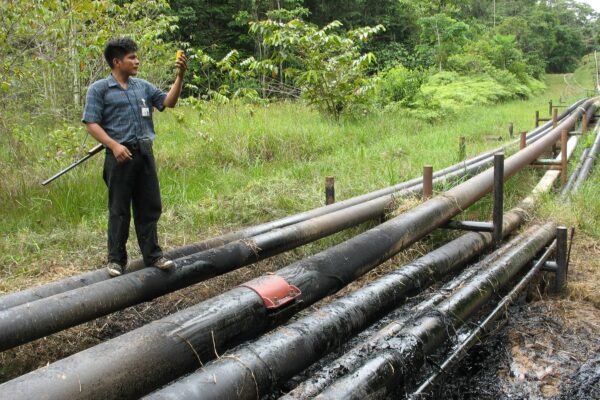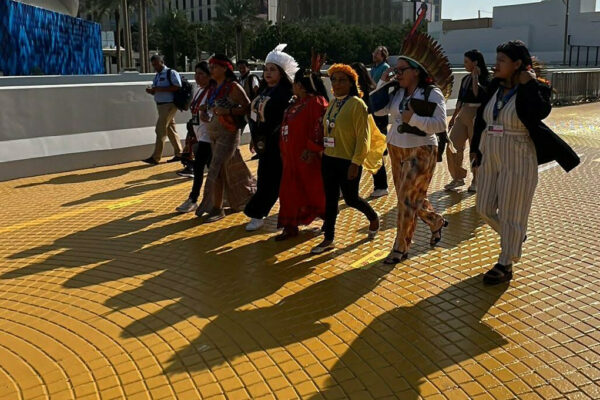Washington, DC – Members of the South American indigenous group, the Huaorani, are calling for a moratorium on all oil activities in their ancestral Amazonian lands in northeast Ecuador.
Two Huaorani leaders traveled to Washington, DC last week and requested assistance in protecting their homelands during visits with Congresswoman Carolyn Maloney, a New York Democrat, and with representatives from the International Monetary Fund, nonprofit organizations.
“Our people have been severely harmed by the intrusion of the petroleum industry onto our lands for the past 20 years,” said Moi Enomenga, a leader of the indigenous tribe who was profiled in Joe Kane’s best-selling book “Savages.”
Of particular concern is the scheduled construction of a new oil road into the core of Yasuní National Park and Huaorani territory, known as Block 31, by the Brazilian oil company, Petrobras.
“We are asking for an immediate moratorium on all new oil projects on Huaorani territory, so that we may organize our communities,” said Enomenga, but that request appears to be too late.
News reports from Ecuador that road construction by Petrobras had begun reached the indigenous leaders in Washington.
Yasuní National Park is the largest park in Ecuador and is among the world’s most important protected areas. The park contains some of the highest records of biodiversity ever documented for trees, amphibians, birds, insects and other wildlife.
Yasuní has been recognized for its outstanding biodiversity by being designated a Biosphere Reserve by the United Nations Educational, Cultural and Scientific Organization (UNESCO).
Eleven species of primates, 23 globally threatened mammals, and many other species of concern, such as the scarlet macaw, the ocelot, the white-bellied spider monkey, the blue-headed parrot, the Amazonian tapir and the giant otter inhabit the national park.
Petrobras’ oil concession Block 31 lies almost entirely within the park and in Huaorani territory.
According to Enomenga, “The company had signed an agreement with a leader of the Huaorani, but the terms of the agreement were not made available to the Huaorani communities, and the leader was subsequently ousted for his lack of transparency.”
Now, Enomenga and other individuals are speaking out for remote forest communities who have had little voice, some of whom are still uncontacted by representatives of other civilizations.
“The former leader who signed the agreement lives in the city,” Enomenga said. “He does not live among us in our communities and does not suffer the same impacts that we do from petroleum development.”
The Huaorani women have recently organized themselves into a group, the Association of the Huaorani Women of the Ecuadorian Amazon (AMWAE), in opposition to oil development because of their frustration with the lack of success in stopping the oil companies.
“We are very familiar with the problems of pollution and illness that impacts our communities because of the petroleum contamination of the water, the destruction of the forests, and harm to animals,” said AMWAE President Alicia Cahuiya. “So, we are doing this as mothers to protect our children and to protect the forests. And, we also want to state that we do not accept any more oil development in our communities.”
A group of more than 50 renowned scientists with research experience in the park have also spoken out about oil exploration, opposing any new oil roads within park boundaries.
It remains to be seen whether Ecuador’s newly implemented government will respect the park’s boundaries.
In April former President Lucio Gutierrez was forced out of office after public protests related to his firing of the Supreme Court.
Gutierrez also was criticized for not doing enough to end political corruption and improve Ecuador’s troubled economy.
On April 20, Ecuador’s Congress voted to oust Gutierrez and unanimously voted to replace him with his Vice President Alfredo Palacio.
Newly installed President Palacio, Environment Minister Anita Alban, and Energy Minister Fausto Cordovez now hold the future of Yasuni National Park in their hands.
“Even though the government does not protect it very well,” Enomenga declared, “we are here to defend our land,”
Many respected scientists have asked that Ecuador forbid construction of the Petrobras road. In January, the world’s largest scientific organization dedicated to the study and conservation of tropical ecosystems, the Association for Tropical Biology and Conservation (ATBC), unanimously passed a resolution calling on the Ecuadorian government to prohibit the construction of the proposed Petrobras road.
“Building a new road in the Amazonian frontier is like opening Pandora’s Box,” said William Laurance of the Smithsonian Tropical Research Institution in Panama, who is president-elect of the ATBC.
“Once a new road goes in, it’s nearly impossible to stop subsequent colonization, over-hunting, and deforestation along the road,” Laurance said.
Last November, 59 neotropical researchers from institutions in 10 countries, calling themselves the Scientists Concerned for Yasuní, wrote a letter to the presidents of Ecuador, Brazil and Petrobras recommending that the proposed road be stopped.
“We concluded that the negative impacts caused by new access roads in primary rainforest environments can not be effectively controlled,” said Margot Bass, executive director of Finding Species and lead editor of the Scientists Concerned for Yasuní report. “We strongly recommend that all planned and future oil extraction in Yasuní utilize a roadless off-shore model.”













